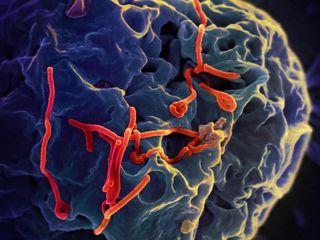Man Recovers From Ebola in Germany After Routine Intensive Care

One man who contracted Ebola and even had further complications of the infection has now recovered after receiving routine intensive care at a hospital in Germany.
The man's case suggests that even if patients do not have access to experimental Ebola drugs, health care workers can still help them recover from the disease, the doctors who treated him wrote in their report of the case.
The report echoes other recovery stories, for example, those of the U.S. healthcare workers who were treated at Emory University in Atlanta and Nebraska Medical Center after contracting Ebola in Africa, said Dr. William Schaffner, an infectious disease specialist at Vanderbilt Medical Center in Nashville, who was not involved in the German case.
When it comes to treating Ebola patients, "It's supportive care, supportive care, supportive care," Schaffner told Live Science. "This [new report] confirms it, and shows that when [Ebola] is appropriately treated, the patient can recover." [2014 Ebola Outbreak: Full Coverage of the Viral Epidemic]
Ebola has sickened more than 9,000 people and killed at least 4,500 in West Africa since the outbreak began in early 2014, according to the Centers for Disease Control and Prevention.
The man at the center of the new case report was a 36-year-old epidemiologist with the World Health Organization, who contracted Ebola while working in Sierra Leone in August. The man had a fever on the second day of his infection, and by day seven developed nausea, vomiting, abdominal pain and diarrhea. On day 10, officials airlifted him to an isolation facility in Hamburg, Germany.
The man developed several complications in addition to Ebola, including a bacterial blood stream infection and respiratory failure, according to the report, which is published online today (Oct. 22) in the New England Journal of Medicine.
Sign up for the Live Science daily newsletter now
Get the world’s most fascinating discoveries delivered straight to your inbox.
The doctors responded with aggressive treatment, giving the man 2.6 gallons (10 liters) of fluid within his first 72 hours in Germany. They also gave him broad-spectrum antibiotic therapy for his blood infection, and put him on a ventilator to help him breathe.
Lessons learned
Putting a patient with Ebola on a ventilator is no small feat. Some doctors worry that using a ventilator, an invasive procedure, may not be effective, or may put health care workers at risk of contracting the disease.
When workers insert a ventilator tube, "You have to get very close to the patient," Schaffner said. "And even though you're wearing all of your protective garb, you're exposed to all of the secretions in the individual's mouth or nose, depending on which way you put it in."
Health care workers also need to suction mucus out of the patient's mouth and bronchial tubes, when needed, to reduce the risk of pneumonia. Medical professionals regularly insert and maintain ventilators in patients who have infectious diseases, such as hepatitis B, hepatitis C and HIV, but because Ebola is highly infectious — meaning exposure to even a tiny amount of body fluids may transmit the infection — the workers were still unsure whether it was safe for medical professionals to insert them into patients with Ebola.
None of the health care workers working with the man contracted the virus, the report said. After the man recovered, he returned to his family in Senegal.
"It's clear now, that when done correctly with appropriate health-care infection control precautions, it can be done effectively," Schaffner said. "That's very, very encouraging."
The enormous amount of intravenous fluids that the doctors gave the man also likely helped him recover, the authors of the case report said.
Dr. Amesh Adalja, a representative of the Infectious Diseases Society of America, agreed this may be a key to treating Ebola patients. "That's what we're hearing about with Ebola patients, including Mr. [Thomas Eric] Duncan [in Dallas], that there was just a tremendous amount of diarrhea, [and it] was very challenging to replace," the lost fluids, Adalja said.
It's unclear whether the man would have recovered faster if he had access to experimental drugs for Ebola, which are still in testing, Adalja said.
"There's still a case to be made for the experimental drug," he said. "But it's clear that supportive care alone clearly made a big difference in this one patient. And it fits with what we know about aggressive supportive care."
Follow Laura Geggel on Twitter @LauraGeggel and Google+. Follow Live Science @livescience, Facebook & Google+. Original article on Live Science.

Laura is the archaeology and Life's Little Mysteries editor at Live Science. She also reports on general science, including paleontology. Her work has appeared in The New York Times, Scholastic, Popular Science and Spectrum, a site on autism research. She has won multiple awards from the Society of Professional Journalists and the Washington Newspaper Publishers Association for her reporting at a weekly newspaper near Seattle. Laura holds a bachelor's degree in English literature and psychology from Washington University in St. Louis and a master's degree in science writing from NYU.
Most Popular


